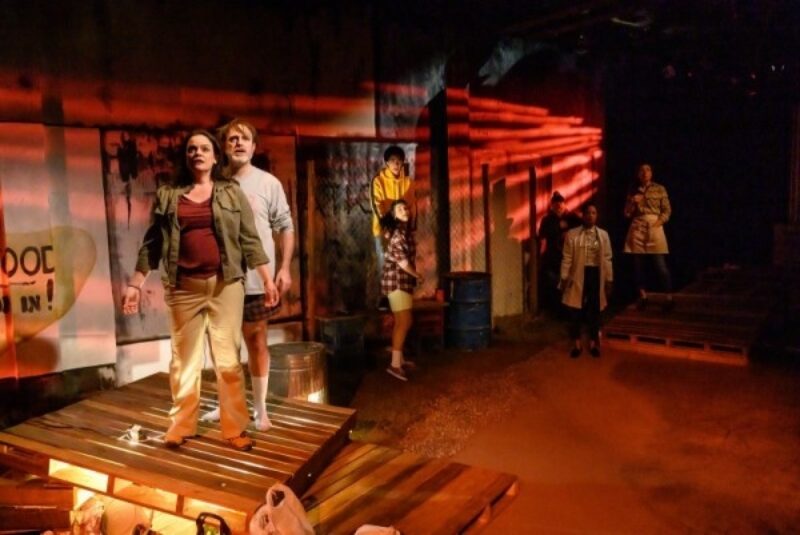Fire Season Uncovers the Brutal Realities of Rural America
Review of Fire Season at Seattle Public Theater.
Written by TeenTix Press Corps Newsroom Writer Olivia Sun, and edited by Teen Editor Hannah Schoettmer!

“What’s past is prologue.” We hear these words of Shakespeare spoken again and again throughout the play, but does it mean that tomorrow is a fresh start? Or does it reveal that history is doomed to set the scene for one’s inevitable fate? As Fire Season draws us into a series of interconnected narratives in a deserted rural Washington town, we are invited to interpret Shakespeare’s classic quote for ourselves.
Fire Season, written by Aurin Squire and directed by Kelly Kitchens, captures the bleak stories of a few residents in a forgotten rural town. Squire shines light upon the struggles of drug addiction, poverty, abortion, and racism that are so often overlooked in the thousands of rural communities across the country. Fire Season is the third production in Seattle Public Theater’s 2018-2019 season #Confronting America, which reveals our nation’s most pressing problems through diverse perspectives.
The play centers around Liz (Kathryn Van Meter), a Walmart employee and mother of two who wants Walmart’s American flag to be lowered in honor of her 12-year-old son’s death. As Liz struggles to take care of herself, her older son Ricky (Pablo Lopez) and his girlfriend Jessamyn (Sofia Raquel Sanchez) must deal with the adult implications of young love. We also follow the stories of characters such as Curtis (Mike Dooly), a veteran and former drug dealer trying to find his footing, and Dr. Anne Cormack (Dedra D. Woods), a black doctor who faces racism and sexism on a daily basis.

Fire Season at Seattle Public Theater. Photo by Truman Buffett.
Although each of these characters face their individual troubles, Kitchens does an incredible job of intertwining their storylines without confusing or overwhelming the audience. At once particular instance, Liz and Curtis converse, young lovers Ricky and Jessamyn dance, Dr. Cormack treats a patient, and a homeless man sleeps on the street. These four scenes happen simultaneously, showcasing Squire’s unconventional approach to storytelling. By overlapping the lives of the various characters, he draws parallels between each of their experiences.
Dr. Cormack’s role is particularly interesting, as she not only embodies the role of a disadvantaged doctor in a practically irreparable town, but also narrates the play’s context with her poetic language. She opens the play with narration revealing that prescription drug overdose is the leading cause of death in her rural Washington town. Following the death of Liz’s son, Dr. Cormack is under meticulous investigation for overprescribing painkillers. She was not involved in the incident, but her pad was stolen from her office prior to the overdose. Woods’ excellent embodiment of her role allows us to sympathize with Dr. Cormack as an innocent and compassionate resident.
Even more, Squire delivers racial commentary through instances of racial prejudice towards Dr. Cormack based on her race: her patients insist that she is a merely a nurse, for example, and the investigator calls her ‘Miss’ rather than her professional title of ‘Doctor’. These examples emphasize how we are far from achieving racial equality in America.

Fire Season at Seattle Public Theater. Photo by Truman Buffett.
Kathryn Van Meter captures Liz’s roller coaster of emotions very well. She powerfully portrays a grieving, working-class mother who is irritated by her community’s’ apathy to the opioid crisis that is slaughtering their youth. Her vulgar language and emotional instability reminded me of so many imperfect, everyday people that I encounter in my own life.
Liz’s antagonistic relationship with her Walmart boss, Phil (Martyn G. Krouse), highlight their contrasting values. Phil is a naive ‘rule-follower’ who cannot stand Liz’s foul mouth and stubborn demands. Liz, on the other hand, is desperate for action to be taken against the drug crisis. The townspeople know that Eli’s death is not an anomaly, which is the problem: kids like Eli will soon be forgotten as just another child lost to drugs.
Liz’s older son Ricky, whom she calls endearingly calls “f*** face,” gets himself into inescapable trouble as he spends more time with his girlfriend due to his mother’s neglect. When he accidentally gets his girlfriend pregnant, he falls into the trap that killed his brother. This irony suggests that poverty forces us to act against our beliefs.
Fire Season gives us a glimpse into the lives of conservative, rural, low-income Americans living in the the plight of rural America. In the show’s program, Squire states that he was inspired by his sister’s experiences, who described the neglected community she worked in as a “third-world country that exists right outside most major American cities.” For many of us, native Seattleites, we become accustomed to the widespread liberal attitudes and economic opportunities available in a large city, and often forget the privilege that we hold in comparison to many others. In a country that is becoming increasingly polarized, this eye-opening production invites us to consider and sympathize with other perspectives before we are so quick to judge and defend.
The Teen Editorial Staff is made up of 5 teens who curate the review portion of the TeenTix blog and manage the TeenTix Newsroom. More information about the Teen Editorial Staff can be found HERE.
The TeenTix Press Corps promotes critical thinking, communication, and information literacy through criticism and journalism practice for teens. For more information about the Press Corps program see HERE.


